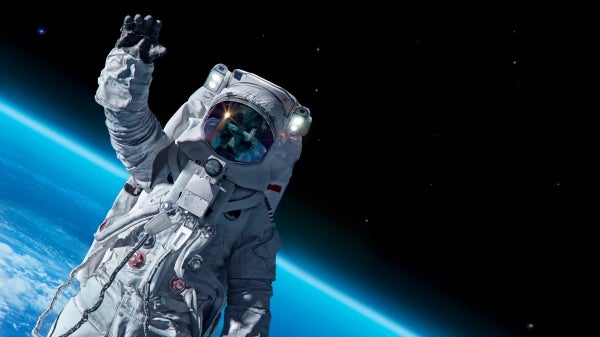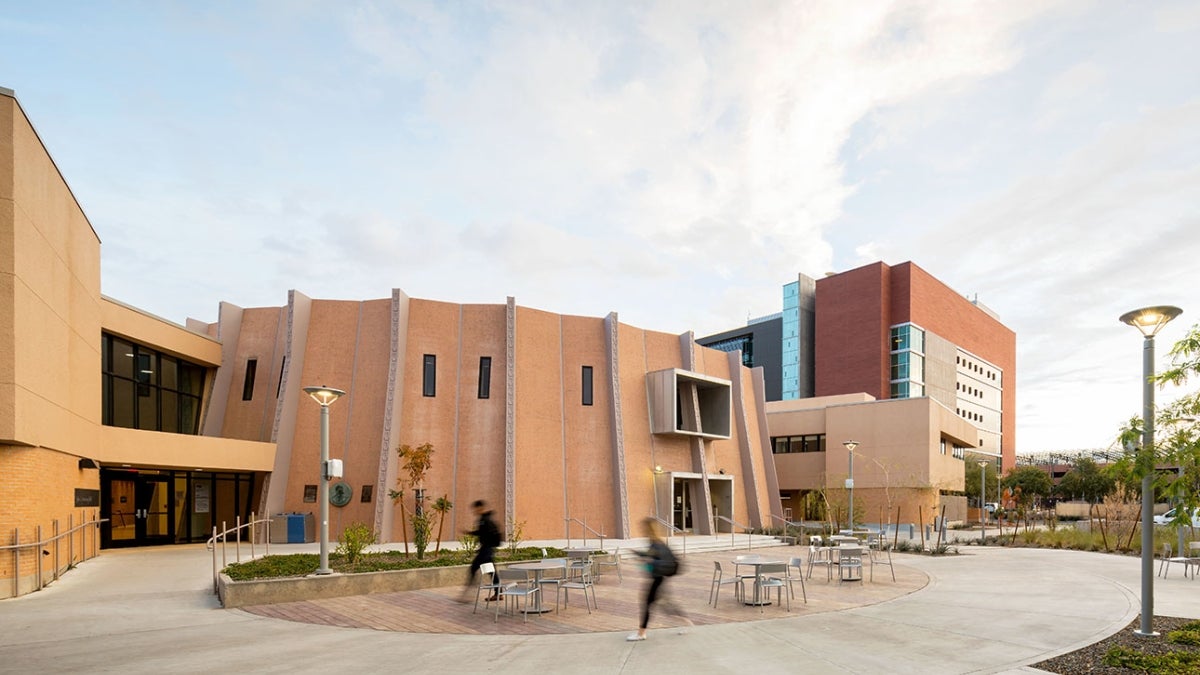Thirteen new faculty members joined The College of Liberal Arts and Sciences natural sciences division at Arizona State University this fall, bringing a wealth of knowledge on a range of topics including psychology, mathematics, earth and space exploration, molecular biology and more. Faculty in the natural sciences at The College work to push the boundaries of scientific knowledge while encouraging students to pursue discoveries that will initiate human progress.
“Our natural sciences faculty are a stellar group of individuals who are working at the forefront of scientific discovery and educational innovation,” said Nancy Gonzales, dean of natural sciences in The College. “We are very excited to welcome these incredibly talented new colleagues who will help us generate new knowledge and build a better future together."
Meet the new faculty members of the natural sciences division:
Department of Psychology

Lauren Friedman
Lauren Friedman is an assistant professor in the Department of Psychology. Her research focuses on understanding the neurocognitive deficits contributing to ADHD symptoms to inform effective, evidence-based treatments in children. In her work, she strives to optimize interventions for children and their families with ADHD by designing and testing an intervention targeting the challenges families face in order to improve outcomes. She recently completed a postdoctoral clinical psychology fellowship at the University of California, San Francisco following her PhD from the University of Central Florida. She received her bachelor’s degree in psychology from Emory University.
School of Mathematical and Statistical Sciences

Naneh Apkarian
Naneh Apkarian is an assistant professor in the School of Mathematical and Statistical Sciences. Her work focuses on mathematics education and departmental change aimed at improving students' experiences with introductory STEM courses. She has a PhD in mathematics education from San Diego State University and University of California San Diego, a master’s degree in mathematics from University of California San Diego and a bachelor’s degree in mathematics from Pomona College.

Shuang Zhou
Shuang Zhou is an assistant professor in the School of Mathematical and Statistical Sciences. Her research focuses on Bayesian methodology for complex objects as well as statistical modeling in real scientific applications. She enjoys identifying and studying statistical problems not only motivated by real-life applications, but also potentially leading to innovations in statistical methodology and theory. She is currently developing Bayesian semi-parametric models to quantify the property of particles in nuclear physics with uncertain control, along with the theoretical support of the Bayesian methodology. Zhou obtained a bachelor's degree in mathematics from Shandong University in China and a PhD degree in statistics from Texas A&M University.
School of Earth and Space Exploration

Katrina Bossert
Katrina Bossert is an assistant professor in the School of Earth and Space Exploration and the School of Mathematical and Statistical Sciences. She is a space physicist who studies dynamics in the near-space region. In her work she uses optical remote sensing instrumentation to look at coupling between the lower atmosphere and thermosphere-ionosphere system. She joins The College after two years as an assistant professor at University of Alaska Fairbanks. Her current projects include investigating the effects of terrestrial weather on space weather, and studying the implications of wave breakdown and turbulence in the spacecraft reentry region. She received a bachelor’s and master’s degree in electrical engineering from the University of Colorado Boulder and a PhD in aerospace engineering from University of Colorado Boulder.
School of Molecular Sciences

Timothy Long
Timothy Long is a professor in the School of Molecular Sciences and the School for Engineering of Matter, Transport and Energy (in the Ira A. Fulton Schools of Engineering). He will direct a new Biodesign Center for Sustainable Macromolecular Materials and Manufacturing. His research looks into the structure-property-morphology-processing relationships of a wide range of polymer systems. He has particular interests in the influence of noncovalent interactions on polymer properties, and more recent interest in sustainable polymer chemistry. Long came to Arizona State University from Virginia Tech, where he was director of the Macromolecules Innovation Institute. He received a bachelor’s degree in chemistry from St. Bonaventure University and a PhD in chemistry from Virginia Polytechnic Institute and State University.
School of Life Sciences

Timothy Balmer
Timothy Balmer is an assistant professor in the School of Life Sciences. His research aims to understand the nerve cells in the auditory system that may be involved in persistent cellular activity that may lead to tinnitus. He served as a peer reviewer of several publications including the Journal of Neuroscience and the Journal of the Royal Society Interface, and has also been widely published. He received his PhD in neuroscience from Georgia State University and his bachelor’s degree in psychology from the University of Puget Sound.

Changbin Chen
Changbin Chen is an associate professor in the School of Life Sciences. His research focuses on understanding the mechanisms of plant meiosis, particularly the regulatory and transition mechanisms in the plant life cycle. His lab works to understand the features of gene expression during meiosis, the regulatory mechanisms of gene expression during plant meiosis, the impact of environmental factors on meiotic recombination and alterations of plant growth by chromosome rearrangement. Prior to coming to ASU he served as an associate professor at the University of Minnesota-Twin Cities. He received his bachelor’s degree in biology at Hubei University in China before pursuing a master’s degree in plant biology from East China Normal University. He completed his PhD in genetics from the Chinese Academy of Sciences, where he also served as a lecturer and associate professor.

Katelyn Cooper
Katelyn Cooper is an assistant professor in the School of Life Sciences. Her lab explores questions of equity and access in undergraduate biology education. Specifically, her lab examines how to make biology learning environments, such as active learning classrooms and undergraduate research experiences, more inclusive for students. She came to ASU from the University of Central Florida where she worked as an assistant professor. She received a bachelor’s degree in biochemistry from ASU and a master’s degree in education from Northern Arizona University before returning to ASU to complete her PhD.

Ke Hu
Ke Hu is a professor in the School of Life Sciences. Her research focuses on understanding fundamental processes in cell biology, especially cellular construction, counting, movement and force-generation. By combining imaging, molecular genetics and evolution-based approaches, she aims to determine how key molecules and structures drive these processes, how they evolve and how this distinct evolution contributes to cellular physiology. Prior to ASU she worked as an associate professor in the Department of Biology at Indiana University. She received a bachelor’s degree in biology from Tsinghua University in Beijing and a PhD in biology from the University of Pennsylvania.

Miyeko Mana
Miyeko Mana is an assistant professor in the School of Life Sciences. Her research focuses on the intersection of stem cells, diet and cancer — specifically looking at how various diets impact stem cells and create vulnerabilities that can lead to transformations resulting in tumor initiation. She came to ASU from the Massachusetts Institute of Technology, where she served as a postdoctoral fellow. She received a bachelor’s degree in biochemistry and molecular biology from California Lutheran University and a PhD in developmental genetics from the New York University School of Medicine.

John McCutcheon
John McCutcheon is the associate director of the Biodesign Center for Mechanisms of Evolution and professor in the School of Life Sciences. McCutcheon studies endosymbiosis, or the process by which one cell becomes a long-term resident inside another cell. He is interested in how and why symbioses form, how they are maintained and what happens as the associations become more and more intertwined. His current work focuses on questions at the cell biological and biochemical level. His lab studies endosymbioses that range from bacterial pathogens to the bacterial endosymbionts of insect crop pests, to the mitochondria and plastids of animal and plant cells.

Noah Snyder-Mackler
Noah Snyder-Mackler is an assistant professor in the Center for Evolution and Medicine and the School of Life Sciences. His research focuses on the interaction between the social and physical environments and the genome. Using molecular genomic techniques, his lab aims to understand the health and fitness consequences of environmental and behavioral variation. Before coming to ASU, Snyder-Mackler served as an assistant professor at the University of Washington and a research affiliate for the Washington National Primate Research Center. He completed his undergraduate and graduate studies at the University of Pennsylvania and received his bachelor’s, master’s and PhD degrees in psychology.

Qiyun Zhu
Qiyun Zhu is an assistant professor in the School of Life Sciences. His research interests include the development of computational tools and resources to improve the analytics of microbiome data, the study of various host and environmental microbiomes and their influence on human health, and the investigation of the evolution of microbes and their hosts, with a focus on vertical and horizontal genetic connections between organisms. Prior to joining ASU, he served as a postdoctoral scholar at the University of California, San Diego. He received his bachelor’s degree in biological sciences from Fudan University, China, and his master’s degree in molecular biology and PhD in evolutionary biology from the University at Buffalo, New York. He came to ASU after 10 years as a faculty member at the University of Montana. He received a bachelor’s degree in biochemistry from the University of Wisconsin at Madison, a master’s degree in human genetics from the University of Utah, a PhD in computational biology from Washington University and postdoctoral training at the University of Arizona.
Top photo: Armstrong Hall on the Tempe campus is home to The College of Liberal Arts, where the natural sciences division is based.
More Science and technology

Brilliant move: Mathematician’s latest gambit is new chess AI
Benjamin Franklin wrote a book about chess. Napoleon spent his post-Waterloo years in exile playing the game on St. Helena. John Wayne carried a set and played during downtime while filming “El…

ASU team studying radiation-resistant stem cells that could protect astronauts in space
It’s 2038.A group of NASA astronauts headed for Mars on a six-month scientific mission carry with them personalized stem cell banks. The stem cells can be injected to help ward off the effects of…
Largest genetic chimpanzee study unveils how they’ve adapted to multiple habitats and disease
Chimpanzees are humans' closest living relatives, sharing about 98% of our DNA. Because of this, scientists can learn more about human evolution by studying how chimpanzees adapt to different…
